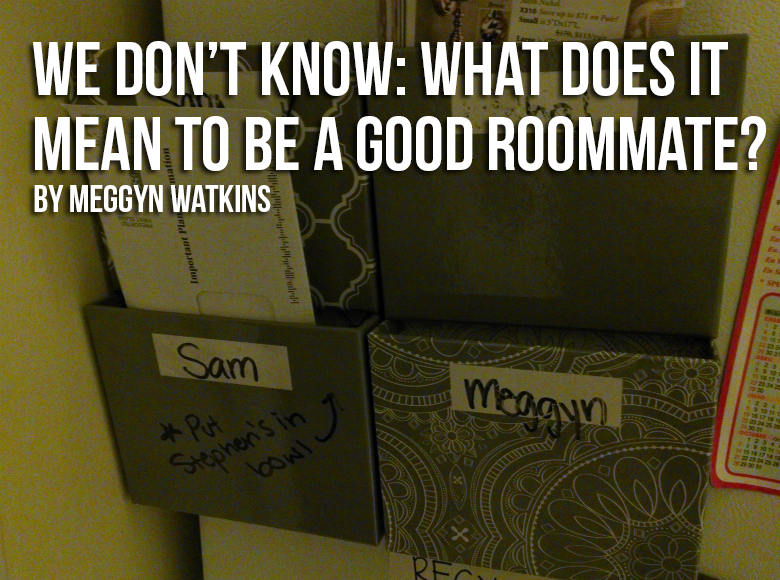Aren’t conflicts just the most fun? Every group of friends, coworkers, or any gathering of people will probably have some sort of drama every now and then.
Be it roommates who aren’t talking because of dishes left in the sink or people who are frustrated about scratch paper being left in the communal copier, it’s good to have a conflict mediation system up your sleeve to help folks work things out. Here are some basic steps:
Assess your Involvement. Are you the best person to be helping these people? Make sure you are actually a neutral party. If you’re not, get the eff out of there: you’ll really only make things worse and get yourself stuck in the middle. Is this a work issue? Make sure you feel comfortable enough with office politics to play this role. As a mediator, your job is not to figure out who is right, but instead to help the aggravated parties create an equitable solution together. Make sure you are coming from the right place.
Set your discussion up. Choose a comfortable, quiet, private place to chat. Start by setting some ground rules for the discussion. These are here to make sure the discussion stays on track and that people are less likely to be hurt by others’ words (because we all know that “sticks and stones” is a huge lie). Good ground rules include:
- ‘I statements’: Participants only talk about their experience of the situation. This doesn’t include what they think others might feel, or why they think others have done something.
Pro tip: “I think you’re a bitch” is not an ‘I statement.’
- Be kind: no yelling, no insults, no storming out.
- If anyone in the group has to leave at a certain time, talk about that now so everyone is aware.
Tell everyone the structure of the discussion, so people know what to expect. Here is a typical structure:
- Each person explains their side of the story and gets heard by everyone else.
- Together, you all explore solutions.
- After exploring, you’ll agree on a solution to start with.
Now it’s time to jump in!
Figure out what actually happened. Start by having each person explain where they are coming from. Flip a coin or draw numbers to see who starts first. In instances with large groups of people, it’s important to repeat this process with each individual, and not set up camps. Each person will have a unique experience of the conflict, and people ganging up on another person will defeat the purpose.
Here is an example, using our imaginary friends Oscar and Martha:
- Martha won the coin toss, so she starts by telling her side of the story and why she is upset.
- Oscar repeats what he heard Martha say without interpretation or explanation.
This is super critical. The goal of this piece of the process is to make sure that each person’s feelings are put out in the open, and each person can confirm that the other person understands. The summary should be something like “Martha says that it she feels frustrated when she comes home to a sink full of dirty dishes.” An example of a bad summary would be “I leave my dishes in the sink, and it doesn’t matter to me, because I have more important things to do than dishes.” As a mediator, it’s really important to keep people from digging in their heels and not trying the process out.
If you are mediating a conflict between a large group of people, have each person say something. They don’t have to tell the whole story back, but it’s critical that person who shared feels like every person understood.
- Martha confirms whether or not Oscar understood her story correctly. I usually ask people “Is that how you feel?” or “Is that what happened?”
- Repeat, but with Oscar’s side of the story.
- If you are in a group, repeat until each individual has had an opportunity to tell their experience.
Take a deep breath. Well done! At this point in the mediation, things should already be looking up. Feeling heard is really powerful, and getting everything out on the table is usually more than half the battle. But, we still have to press on…
As mediator, identify key words and issues. Is someone looking for respect? Cleanliness? Remuneration? What were some needs that were identified as not being fulfilled? Choose the issues that need to be resolved, and get ready to start looking for solutions. Make sure to check first with the people who are upset—it would make things way worse to assume you know exactly what the biggest issues are.
- A great way to ask this is, “It sounds like it really bothers you, Martha, when you come home and find dishes in the sink, is this true? Can I list this as one of the main issues to focus on?”
- There is no right number of issues to focus on—it totally depends on the conflict and how much time you have. If you are pressed for time, make sure to ask the people you are helping what the most important things to focus on are.
Start Looking for Solutions. With the person who lost the coin toss starting first (Oscar in our case) or the last person to speak if in a large group, start asking your conflicted parties to suggest solutions to each issue. Each person should suggest a solution, and then there should be time to think before swapping to the other person. Go issue-by-issue and write the suggestions down until you have a good brainstorm of solutions.

Photo by Anastasia Heuer
Check In. Take a beat. Check in with those involved. Are they feeling good? Hopeful? Frustrated? If they are not feeling so great, go back and explore more about what is really going wrong. You may be focusing on something totally incorrect!
Make a Plan. Once you have a list of solutions and everyone’s feeling good, make an action plan, and make it SMART. That is, Specific, Measurable, Attainable, Relevant and Time-bound. A bad solution would be “Oscar will wash the dishes,” but a SMART solution is “Oscar will wash dirty dishes within 24 hours of using them.” The latter solution can be checked in a way that the former can’t, and that makes it really easy to identify when Oscar hasn’t followed up.
Check Back. Make a time to check in with the involved parties to see how they are doing. Make plans for coffee a week or two later to see how they are feeling and reassess then.
Want to read more about conflict resolution? My favorite resource is The Center for Nonviolent Communication


